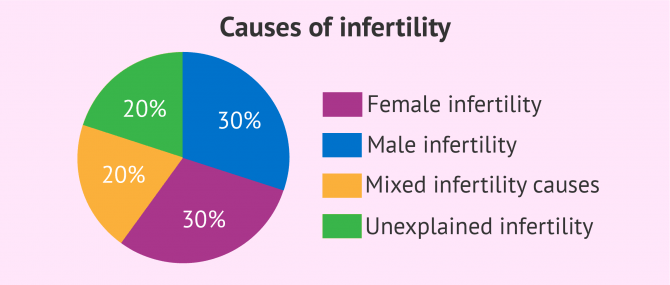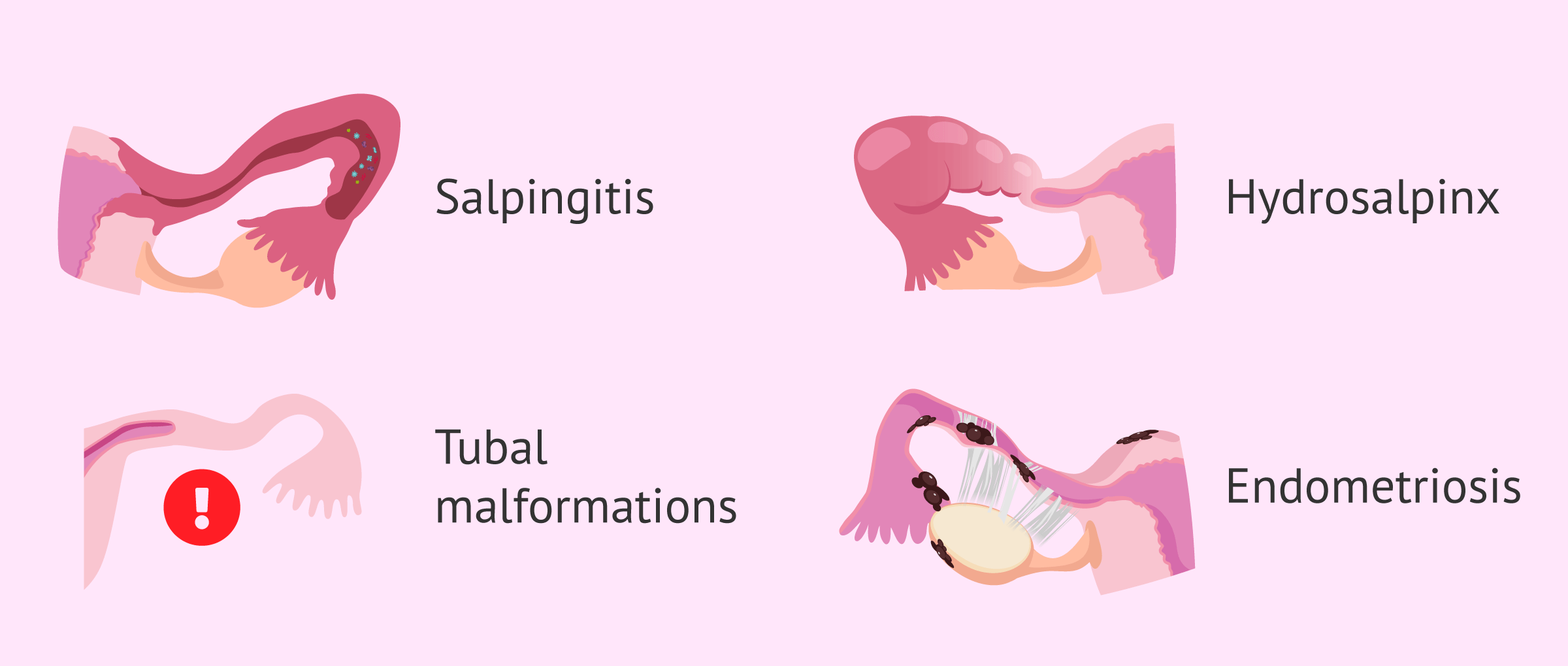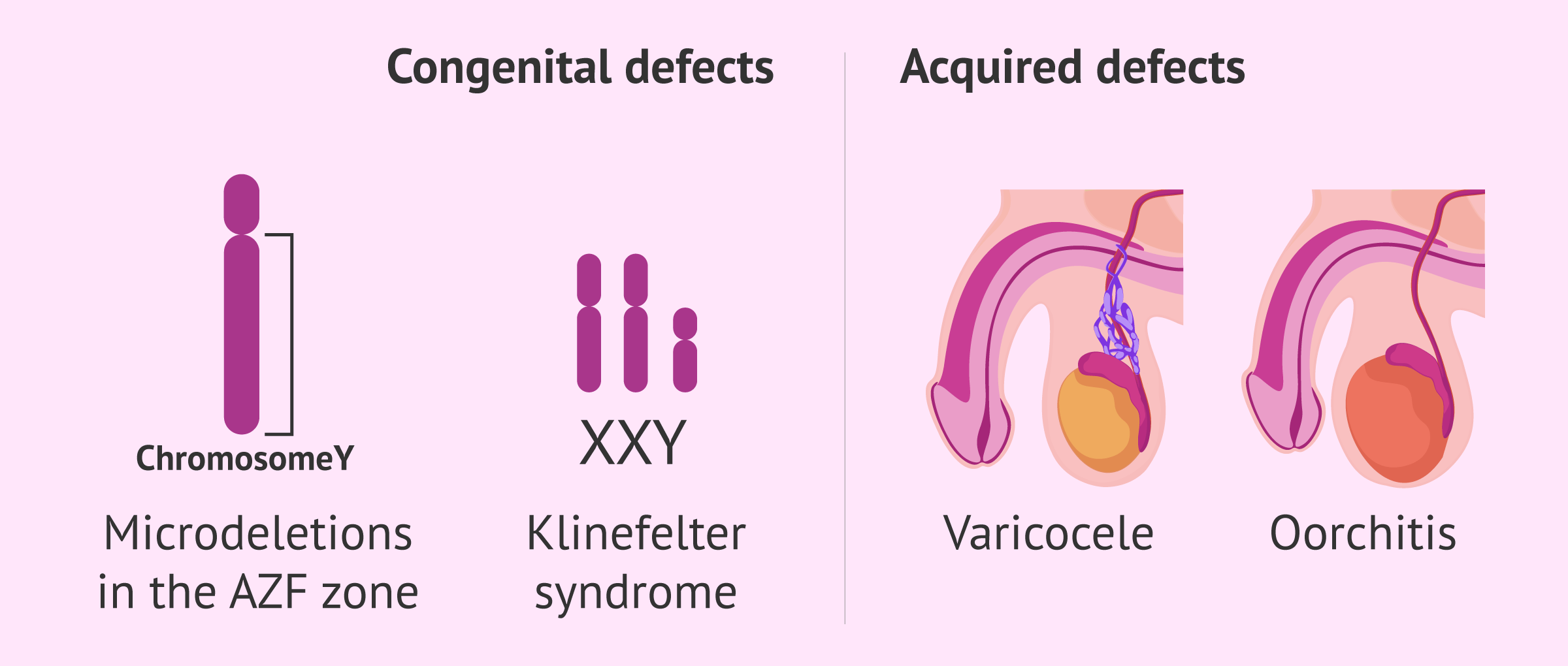To find out the cause of infertility in a couple, a series of tests must be carried out on both the man and the woman. Depending on the results obtained in this fertility study, it will be possible to know whether the fertility problem is male, female or a combination of both.
Some of the most common causes of infertility are advanced maternal age, tubal lesions, alterations in sperm production and problems in the semen, endometriosis, etc.
Therefore, if after a year of regular sexual intercourse a pregnancy has not been achieved, it is recommended to visit a specialist to determine the origin of the problem in order to conceive.
Provided below is an index with the 9 points we are going to expand on in this article.
- 1.
- 2.
- 2.1.
- 2.2.
- 2.3.
- 2.4.
- 3.
- 3.1.
- 3.2.
- 3.3.
- 3.4.
- 4.
- 5.
- 6.
- 6.1.
- 6.2.
- 6.3.
- 6.4.
- 6.5.
- 7.
- 8.
- 9.
Main causes of infertility in couples
Infertility issues in couples can be caused by the man, the woman, or both. Statistics show a similar frequency, with 30% of the cases having a male origin, and another 30% a female one.
The remaining 40% can be distributed between mixed or combined causes, which occurs in 20% of the cases, and unexplained infertility, present in another 20%.
In the case of mixed-cause infertility, both partners have alterations in their fertility that are causing their inability to have a child. On the other hand, in cases of infertility of unknown origin, no explanation for the problem can be found.
Female infertility
When it comes to female infertility, the causes may be varied but interrelated, and may be caused by different factors. Thus, a woman can have any of the following dysfunctions:
- Ovary problems
- Due to either problems with ovulating, or poor egg quality.
- Tubal factor
- Due to Fallopian tube problems, which can prevent or hinder the passage of the oocyte and the sperm.
- Cervical factor
- Problems with the cervix, which can hinder or even block the pathway of sperm toward the egg.
- Uterine factor
- Uterine fibroids, uterine adhesions, uterine abnormalities, poor endometrial development...
You may also enjoy some further information reading this: What Causes Female Infertility? – Definition, Signs & Treatment.
Ovarian causes
Hormonal alterations in the menstrual cycle of the woman can prevent ovulation (i.e. anovulation), cause it to occur in the wrong moment, or occur but the eggs are produced incorrectly.
The endocrine system is responsible for controlling the ovarian cycle. For this reason, alterations caused by stress, obesity, low weight, thyroid gland problems, medications, etc. can affect the normal functioning of the ovary.
To examine the ovary and ovulation, the specialist runs a series of ultrasounds and hormonal blood tests to look for potential pathologies that may be causing infertility in the patient.
We recommend you visit the following link for more in-depth information: What Are the Endocrine Causes of Female Infertility?
Tubal factor
By tubal factor infertility we refer to any abnormality or dysfunction that appears in the Fallopian tubes of females. This organ allows two major events:
- The egg-sperm binding.
- The journey of the embryo to the uterus.
Thus, if the tubes do not carry out their function, the woman will be infertile. This happens when block tubes are blocked due to a variety of reasons, such as salpingitis, malformations, hydrosalpinx, endometriosis, etc.
In order for a diagnosis of tubal problems to be rendered, performing a hysterosalpingography (HSG) is necessary. This is an essential test when it comes to evaluating female fertility. As long as tubal patency exists in one tube, that is, as long as one tube is not blocked, pregnancy can take place.
You have much more information on this topic in the following article: Tubal Factor Infertility - Causes & Treatment.
Cervical causes
If sperm cannot go through the cervix, they will never reach the egg. Abnormal growths in this part of the female reproductive system, including polyps or fibroids, along with abnormalities of the cervical mucus can lead to infertility in the woman.
When the specialist suspects that this may be the reason for the fertility problem, he or she will order tests such as a postcoital test, microbiological cultures or a hysteroscopy, for example.
If you are interested in this reason for female infertility, we advise you to continue reading the following article: Female infertility owing to a cervical factor.
Uterine causes
Uterine abnormalities, including malformations or endometrial problems, can cause infertility issues by preventing implantation or a full-term pregnancy.
Amongst the most common uterine causes of infertility, we can mention endometriosis, fibroids, and polyps. Read more: Uterine Factor Infertility – Diagnosis, Characteristics & Treatment.
Why does male infertility occur?
As regards male infertility, there exist four types depending on the cause:
- Pre-testicular factor
- Due to hormonal imbalances, the testes are not fully developed or are unable to carry out their function.
- Testicular factor
- Testicular disorders, whether congenital (from birth) or acquired.
- Post-testicular factor
- Including abnormalities of the seminal ducts, sexual impotence, or any kind of urinary tract infection.
- Sperm disorders
- All types of alterations in sperm parameters.
Click here to read more: What Causes Male Infertility? – Symptoms, Treatment & Statistics.
Pre-testicular causes
It includes hormonal causes due to a poor endocrine regulation. As a result, the development of any of these parts can be altered:
- Testicles
- Seminiferous tubules
- Spermatogenesis (sperm production process)
- Male reproductive system in general
A blood test for hormone levels is the only test that can detect pre-testicular causes of male infertility.
Testicular causes
It refers to any kind of disorder or defect in the testes, whether congenital or acquired.
- Congenital defects
- Usually due to genetic abnormalities, like the Klinefelter syndrome.
- Acquired defects
- They can be caused by medications, drugs, infections, trauma, or conditions, like varicocele or orchitis.
You can read more in depth at this link: Testicular Disorders & Infertility - Impact on Reproductive Function.
Post-testicular causes
This type of infertility is due to abnormalities or disorders in the seminal ducts, which include the epididymis, vasa deferentia, and urethra. Sperm must go through this pathway before being released with ejaculation.
In this case, infertility can be due to infections, blockages, or trauma. All of them can prevent sperm from being ejaculated.
Sperm factor
The leading cause of male infertility. It is due to disorders in the sperm, whether they affect their morphology, vitality, or count.
The following are the most common sperm disorders:
- Oligospermia or oligozoospermia
- Low sperm count.
- Asthenozoospermia
- Poor sperm motility.
- Teratospermia or teratozoospermia
- High amount of abnormally shaped sperm.
- Necrospermia or necrozoospermia
- Elevated presence of dead sperm.
- Azoospermia
- Zero sperm count.
The only method to detect the presence of a sperm disorder is a semen analysis, also known as seminogram or sperm test.
Combined or mixed infertility
In some cases, childlessness is present in both partners. In other words, the cause(s) of infertility will be the result of combining any of the male and female infertility issues mentioned above.
Nonetheless, in some cases infertility is due to immunological incompatibility. In these cases, the immune system of the woman attacks the sperms of the man. For this reason, both members may be fertile and are examined individually, but together conception is not possible unless they seek medical assistance.
According to Dr. Gorka Barrenetxea, Obstetrician & Gynecologist specialized in Reproductive Medicine:
It is common for us to find abnormalities in both members of the couple, including a sperm count under the normal reference values, a diminished ovarian reserve, tubal problems, etc.
What is unexplained sterility?
When the cause of infertility is unclear, we refer to it with the term unexplained infertility or unknown infertility. It occurs in approximately 20% of the cases. Despite performing the appropriate tests, specialists fail to find a cause that explains why the woman is not getting pregnant.
Unexplained infertility does not translate into the absence of fertility issues, but into unavailability of specific tests that allow the detection of whatever is causing infertility in the couple. Some cases are so challenging that the different tests available nowadays are insufficient to find the actual cause of sterility.
The good news is that unknown infertility can be tackled with Assisted Reproductive Technology (ART) as well, namely Intrauterine Insemination (IUI) or In Vitro Fertilization (IVF).
You can find much more information on this topic here: What Is Unexplained Infertility? - Causes, Diagnosis & Treatment.
Considering undergoing a fertility treatment? By getting your individual Fertility Report your will see different clinics especially selected for you out of the pool of clinics that meet our strict quality criteria. Moreover, it will offer you a comparison between the fees and conditions each clinic offers in order for you to make a well informed choice.
FAQs from users
Does age affect male fertility?
The age of the male in the reproductive processes can alter the achievement of pregnancy. Although it is not the main cause of infertility in couples, it is an aspect to be studied and treated to improve reproductive success.
Read more
Do oral contraceptives affect fertility?
There has always been much concern on the part of women who take or have taken contraceptives as to whether they will affect their future fertility. There have also been many studies that have tried to find the relationship between contraceptives and their implication for fertility... and the answer is now clear. Contraceptives do not affect future fertility.
It must be understood that a woman's follicular endowment is depleted over the course of her reproductive life, and does so on the basis of a programmed follicular atrophy mechanism. This does not depend on the contraceptives she takes, nor on the pregnancies she has, nor on breastfeeding..... In other words, the fact that the ovaries are not functioning in a normal hormonal cycle, because they have stopped functioning, either because of contraceptives or other situations such as pregnancy, does not stop this programmed atrophy, which will continue to occur month after month, regardless of this.

Therefore, it is clear that taking contraceptives will not affect a woman's follicular endowment or future fertility. On the contrary, there are women who need to take contraceptives as therapy for certain pathologies, such as endometriosis, so that if they stop taking them when indicated, the disease may progress and the follicular endowment may be lost at an accelerated rate.
However, this does not mean that contraceptives do not affect fertility at the time they are taken. The composition of contraceptives based on the hormones produced by the ovary means that the hormonal axis that governs the reproductive function in these women is annulled, ovulation does not occur and therefore pregnancy is prevented.
Can birth control cause female infertility?
Women who have been using hormonal contraception for a long period of time can take several month to recover normal menstrual cycles, and therefore their fertility. So the answer is yes, hormonal contraceptives can cause temporary infertility in females.
If we have already had one child, what can be the cause of infertility in a second pregnancy?
Having had a child previously does not mean that there cannot be infertility problems when seeking a second pregnancy. When this happens we are dealing with a case of sterility or secondary infertility.
The causes can be the same as in primary infertility, so the appropriate male and female fertility tests should be performed to determine which of the aspects mentioned above is causing the problem.
What are the causes of infertility at age 40?
In couples where the woman is 40 or older, it is likely that the cause of infertility is due to ovary problems associated with advanced maternal age. It is quite common for women at this stage in their reproductive years to experience hormonal imbalances that cause their menstrual cycle to develop inadequately. Moreover, the ovarian reserve experiences a dramatical decrease from age 35 onwards.
Suggested readings
If you have just received a diagnosis of infertility and been referred to fertility treatment, you might feel a bit overwhelmed due to so much new information. You can learn more here: What is Assisted Reproductive Technology (ART)? – Techniques & Costs.
Throughout this post, what you found is a brief summary of the different causes of male and female infertility. If you wish to delve deeper into the tests performed to identify them, we recommend that you visit any of these posts:
We make a great effort to provide you with the highest quality information.
🙏 Please share this article if you liked it. 💜💜 You help us continue!
References
Aboulghar, MA, Mansour RT, Serour GI, Amin Y, Ramzy, AM, Sattar MA and Kamal, A (1999). Management of long-standing unexplained infertility: a prospective study. Am K. Obstet. Gynecol (View)
Chandra A, Mosher WD. The demography of infertility and the use of medical care for infertility. Infertil Reprod Med Clin North Am 1994;5: 283–96.
Crosignani PG, Rubin BL. ESHRE Capri Workshop Group. Optimal use of infertility diagnostic tests and treatments. Hum Reprod 2000; 15: 723-732 (View)
ESHRE 1996 Guidelines to the prevalence, diagnosis, treatment and management of infertility. The ESHRE Capri Workshop. Human Reproduction 11, 1176 – 1807.
Gleicher N, Barad D. Unexplained infertility: Does it really exist? Hum Reprod 2006; 21: 1951-55 (View)
Hull MG, Glazener CM, Kelly NJ, Conway DI, Foster PA, Hinton RA, Coulson C, Lambert PA, Watt EM, Desai KM. Population study of causes, treatment, and outcome of infertility. Br Med J (Clin Res Ed) 1985; 291(6510):1693-7 (View)
Krausz C, Genetic Aspects of Male Infertility, European Urological Review, 2009;3(2):93-96.
Ramalho de Carvalho B, Gomes Sobrinho DB, Vieira AD, Resende MP, Barbosa AC, Silva AA, Nakagava HM. Ovarian reserve assessment for infertility investigation. International Scholarly Research Network. ISRN Obstetrics and Gynecology. Volume 2012.
Rantala ML. Causes and outcome of infertility in previously unexamined couples. Acta Obstet Gynecol Scand 1988;67:429-32.
Rowe PJ, Comhaire FH, Hargreave TB, Mellows HJ 1993 WHO manual for the standardized investigation and diagnosis of the infertile couple. Cambridge University Press, Cambridge, UK.
Weidner W, Colpi GM, Hargreave TB, Papp GK, Pomerol JM, Ghosh C; EAU Working Group on Male Infertility (2002). EAU guidelines on male infertility. Eur Urol;42:313-22 (View)
FAQs from users: 'Does age affect male fertility?', 'Can low sperm volume cause infertility?', 'Do oral contraceptives affect fertility?', 'Can birth control cause female infertility?', 'If we have already had one child, what can be the cause of infertility in a second pregnancy?', 'What are the causes of infertility at age 40?', 'Do cats or dogs cause infertility in humans?', 'Can stress cause female infertility?' and 'Can HPV cause infertility in females?'.
Authors and contributors

More information about Cristina Algarra Goosman















Hi, I have been trying to get pregnant for 4 months, when I was younger I was told I had a septate uterus, could this be the reason why I am not pregnant? Thank you
Hello Lucy,
The septate uterus can hinder pregnancy implantation if the septum is positioned in such a way that it makes implantation and proper embryo growth impossible.
In any case, I recommend that you go to the doctor to assess the state of your uterus and if it is in ideal conditions to accommodate pregnancy.
You say that you have been looking for pregnancy for 4 months, it is normal that it takes up to a year before it is considered a fertility problem. This time is reduced to 6 months if the woman is older than 35 years.
I hope I have helped you.
Best regards
Hello, I have been taking contraceptives for 10 years, how long will it take me to stop taking them?
Hi Vanessa,
Hormonal contraceptive methods may take a couple of cycles to return, anyway it is advisable that you perform a blood test on the third day of your menstrual cycle, in this analysis can determine the status of your ovarian reserve and thus your reproductive options.
I hope I have helped you.
Best regards.